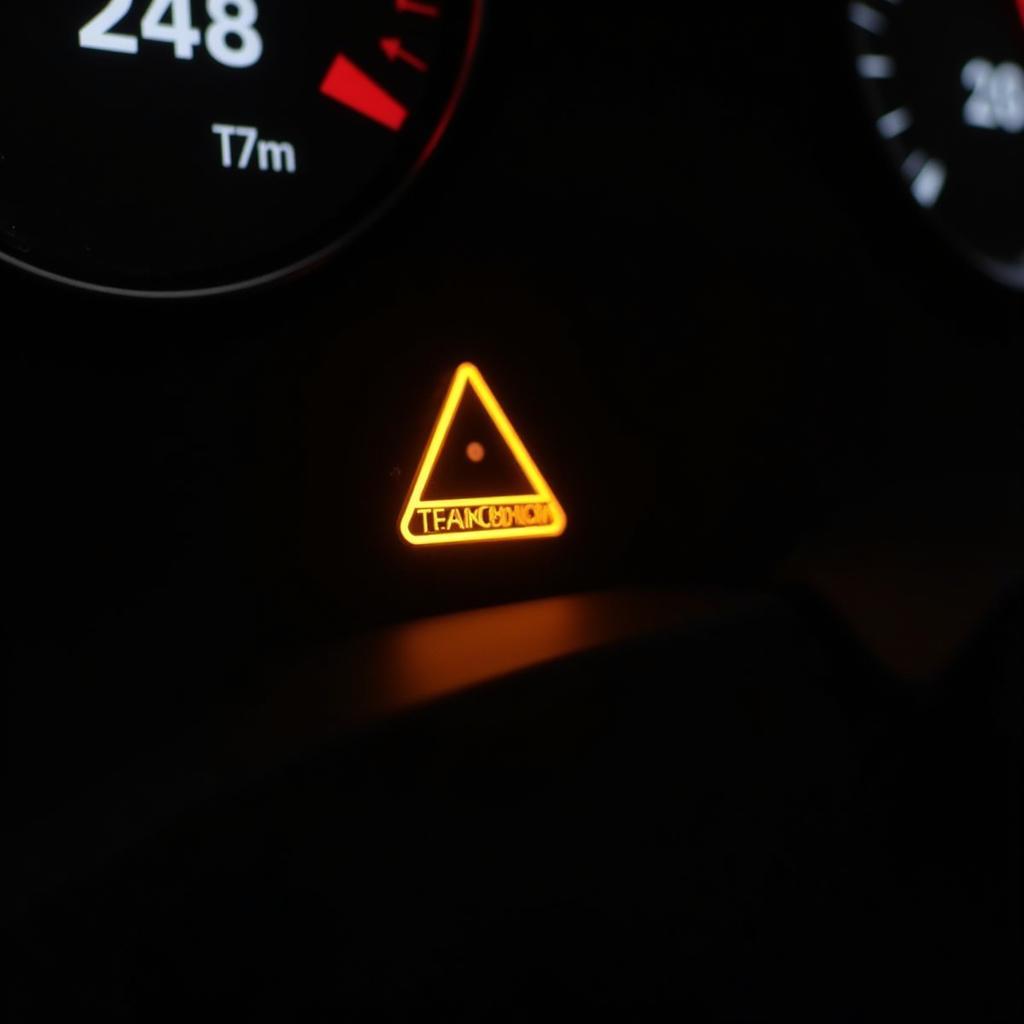A brake warning light on your Pontiac Bonneville can be a scary sight. It indicates a potential issue with your braking system, which is crucial for your safety and the safety of those around you. The good news is that most brake warning light issues can be addressed relatively easily. In this guide, we’ll explore common causes for the brake warning light to illuminate on a Pontiac Bonneville, how to identify the problem, and what steps you can take to resolve it.
What Causes a Brake Warning Light to Come On?
A brake warning light can be triggered by various factors, ranging from a minor issue like a worn brake pad to a more serious problem like a faulty brake system component. Here are some of the most common causes:
- Low Brake Fluid: The brake system relies on hydraulic fluid to operate. When fluid levels drop below a certain threshold, the warning light will illuminate. This is a common issue that can be easily resolved by topping off the brake fluid reservoir.
- Worn Brake Pads or Rotors: As brake pads wear down, the sensors embedded in them will trigger the warning light, indicating that it’s time for a brake pad replacement. Worn brake rotors can also contribute to brake warning light issues.
- Faulty Brake Light Switch: This switch is located near the brake pedal and is responsible for turning on the brake lights when you press the pedal. A faulty switch can lead to a brake warning light and inconsistent brake light operation.
- Faulty Parking Brake System: A malfunctioning parking brake can sometimes cause the brake warning light to illuminate.
- ABS System Malfunction: The Anti-lock Braking System (ABS) is a crucial component of your vehicle’s safety system. A fault in the ABS system can lead to the brake warning light coming on.
- Faulty Wheel Speed Sensors: Wheel speed sensors monitor the rotation of each wheel and play a role in the ABS system’s operation. If a sensor malfunctions, the ABS system might be affected, leading to the warning light.
How to Identify the Problem
Diagnosing the cause of a brake warning light can be a little tricky for the average car owner. Here are some tips to help you narrow down the possibilities:
- Check the Brake Fluid Level: Locate the brake fluid reservoir (usually near the engine) and inspect the fluid level. If it’s low, top it off with brake fluid compatible with your vehicle’s system.
- Listen for Abnormal Sounds: While braking, listen for any grinding, squealing, or other unusual noises, which can indicate worn brake pads or rotors.
- Inspect the Brake Lights: Make sure all your brake lights are working properly by having someone press the brake pedal while you observe the lights from behind the vehicle.
Getting Professional Help
If you’re unsure about the cause of the brake warning light or you’re not comfortable diagnosing it yourself, it’s best to take your Pontiac Bonneville to a qualified mechanic.
“It’s never a good idea to ignore a brake warning light. It’s a sign that something is wrong with your braking system, and it’s important to have it checked out as soon as possible,” says John Smith, a certified automotive technician with over 20 years of experience.
Common Brake Warning Light Issues in Pontiac Bonnevilles
Pontiac Bonnevilles, like any other vehicle, can experience certain brake warning light issues more frequently than others.
- Brake Fluid Leaks: Pontiac Bonnevilles are known to sometimes have issues with leaking brake fluid. This can be caused by worn or damaged brake lines or calipers.
- ABS Sensor Malfunctions: ABS sensors in Pontiac Bonnevilles are susceptible to failure, especially in harsh weather conditions.
- Worn Brake Pads and Rotors: Like most vehicles, Pontiac Bonnevilles require regular brake pad and rotor replacements, as these components wear down over time.
What To Do When Your Brake Warning Light Comes On
If your brake warning light comes on, the following steps are recommended:
- Pull Over Safely: As soon as it’s safe to do so, pull over to the side of the road.
- Check the Brake Fluid Level: If the fluid level is low, top it off. If it’s full, there might be a leak.
- Avoid Hard Braking: Avoid hard braking or sudden stops to prevent further damage to the brake system.
- Contact a Mechanic: Call a qualified mechanic to diagnose and repair the issue.
FAQ
Q: What does the brake warning light mean?
A: The brake warning light indicates a potential problem with your braking system. It’s important to have it checked out as soon as possible.
Q: Is it safe to drive with a brake warning light on?
A: It’s generally not safe to drive with a brake warning light on. It means there’s a problem with your braking system, which could lead to a loss of braking ability.
Q: Can I reset the brake warning light myself?
A: You can sometimes reset the brake warning light by topping off the brake fluid or replacing a faulty brake light switch. However, if the warning light comes back on, it’s best to have a mechanic inspect the system.
Q: How much will it cost to fix a brake warning light issue?
A: The cost of fixing a brake warning light issue can vary depending on the problem and the specific model of your Pontiac Bonneville. Minor issues like topping off brake fluid might cost only a few dollars, while more complex repairs could cost several hundred dollars.
Conclusion
Ignoring a brake warning light can have serious consequences. It’s crucial to address the problem promptly to ensure your safety and the safety of others. If you notice this warning light on your Pontiac Bonneville, get it checked out by a trusted mechanic as soon as possible. A safe and reliable braking system is essential for a smooth and secure driving experience.

